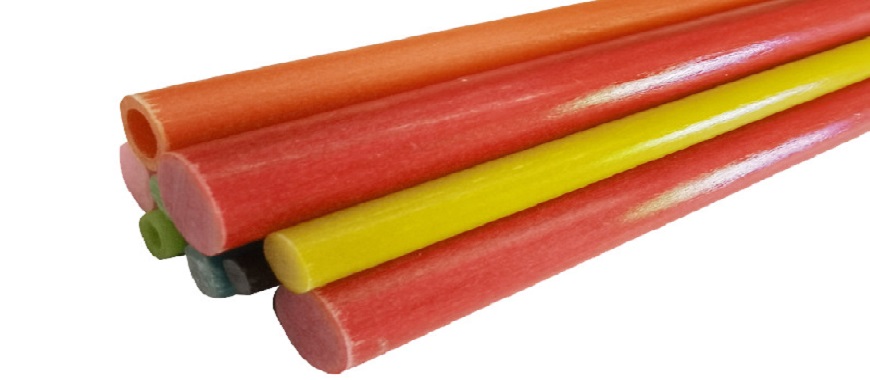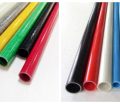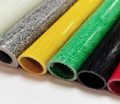
In the realm of materials capable of withstanding high temperatures and hostile environments, refractory materials stand out as essential components in various industrial processes. These materials are specifically engineered to maintain their strength and integrity even when exposed to extreme heat, making them indispensable in industries such as aerospace, manufacturing, and energy production. Among the vast array of refractory materials, refractory fiberglass insulation tubes have carved a niche for themselves. These tubes play a pivotal role in ensuring thermal efficiency and safety in high-temperature operations. Their ability to provide excellent insulation while also being resistant to chemical corrosion makes them a preferred choice for heat management in critical industrial applications. By understanding the properties and applications of refractory fiberglass insulation tube, industries can better harness their potential to improve operational efficiency and safety standards, highlighting their importance in the modern industrial landscape.
What is Refractory Fiberglass Insulation Tube
When it comes to enhancing industrial operational efficiency and safety, the role of refractory fiberglass insulation tube components cannot be emphasized enough. These critical elements serve multiple functions across industries due to their unique properties and composition. In this detailed exploration, we delve into what refractory fiberglass insulation tubes are, their key features, and the myriad benefits they offer across different sectors.
Definition and Key Features
Refractory fiberglass insulation tubes are designed to withstand extreme temperatures and harsh environmental conditions, making them an ideal choice for insulation purposes in high-heat applications. Here are eight key features that define their utility:
- High-Temperature Resistance: These tubes can operate under conditions of elevated temperatures without losing their structural integrity or performance capabilities.
- Low Thermal Conductivity: This property ensures excellent thermal insulation, preventing heat loss and optimizing energy efficiency.
- Chemical Resistance: They exhibit resistance to a broad range of chemicals, making them suitable for use in corrosive environments.
- Low Water Absorption: This feature allows them to maintain their insulating properties even in moist conditions.
- Mechanical Strength: Despite their insulation capabilities, these tubes also boast significant strength and durability.
- Flexibility: Their composition allows for easy cutting and fitting around complex shapes and sizes, offering versatility in installation.
- Lightweight: This characteristic makes them easy to handle and install, reducing overall project times and costs.
- Fire Resistance: They are inherently fire-resistant, adding an extra layer of safety in fire-prone environments.
Composition and Material Specifications
At their core, refractory fiberglass insulation tubes are composed of high-quality glass fibers. These fibers are bound together with a resin, and this composition gives the tubes their distinctive properties. Key material specifications include:
- Winding Angle: The fibers in the tubes are wound at specific angles to enhance strength and flexibility.
- Fiber Content: The percentage of fibers within the composite material directly impacts the tube’s insulation performance.
- Density and Water Absorption Rate: These tubes are engineered to have a low density, which contributes to their lightweight nature while also maintaining a minimal water absorption rate to ensure long-term performance even in damp conditions.
Custom Large Diameter Fiberglass Tube: Strong and Reliable
Benefits of Using Refractory Fiberglass Insulation Tube in Various Industries
The adoption of refractory fiberglass insulation tube technology brings numerous benefits across a wide spectrum of industries, including enhanced thermal performance and improved energy efficiency. Furthermore, when combined with filament wound fiberglass tubing, this technology ensures a robust and durable solution that can withstand extreme conditions, making it ideal for applications in sectors such as aerospace, construction, and marine engineering.
- Improved Energy Efficiency: By minimizing heat loss, these tubes help facilities reduce their energy consumption and costs.
- Enhanced Safety: Their fire-resistant properties contribute to safer working environments, particularly in industries where fire risk is a concern.
- Longevity and Durability: The tubes’ resistance to chemical corrosion and high temperatures ensures a long service life with minimal maintenance required.
- Environmental Protection: With improved energy efficiency and reduced material waste, these tubes support more sustainable industrial practices.
- Customizability: Available in various sizes and specifications, they can be tailored to meet specific application requirements.
- Cost-Effectiveness: Despite their advanced features, the tubes offer an economical solution due to their durability and the reduction in energy costs they facilitate.
- Simplicity of Installation: Their lightweight and flexible nature makes them easy to install, even in challenging or tight spaces.
- Versatility: Suitable for a wide range of industrial applications, from aerospace to energy production, these tubes offer a universal solution to thermal management challenges.
As industries continue to seek more efficient and safer operational practices, the importance of refractory fiberglass insulation tube components grows, further solidifying their standing as a critical element in the modern industrial toolkit.
Manufacturers and Suppliers of Refractory Fiberglass Insulation Tube
In the global market of thermal insulation materials, refractory fiberglass insulation tubes have become paramount for their robustness and effectiveness in high-temperature applications. Among a myriad of manufacturers, three stand out due to their commitment to quality, innovation, and customer satisfaction.
GangLong Fiberglass
As the premier manufacturer in this niche, we, at GangLong Fiberglass, pride ourselves on our state-of-the-art technology and innovative approach in producing refractory fiberglass insulation tubes. Our products are designed with the highest precision, ensuring they meet the intricate needs of our diverse clientele. Our commitment to excellence is unwavering, and we continuously strive to exceed industry standards, making us a trusted brand worldwide.
Apart from our dedication to quality, we believe in fostering strong relationships with our customers. Understanding their unique needs allows us to provide customized solutions that are unmatched in the market. Our refractory fiberglass insulation tubes are not only tailored to specific industrial applications but are also engineered to withstand extreme temperatures, ensuring longevity and reliability.
How to choose the right supplier
Choosing the right supplier for refractory fiberglass insulation tubes is crucial for the success of any project. Here are essential points to consider:
- Proximity: Choosing a supplier near you reduces lead times and shipping costs, ensuring quicker project turnaround.
- Local Support: Local suppliers can provide better on-site support and are more accessible for consultations and troubleshooting.
- Market Understanding: Suppliers in your region better understand the local market and regulatory requirements, ensuring compliance.
- Economic Benefits: Supporting local businesses contributes to the local economy and can foster stronger business relationships.
- Environmental Impact: Less travel distance for the product means a smaller carbon footprint, aligning with eco-friendly practices.
- Logistical Advantages: Local suppliers can offer flexible delivery options, including expedited or just-in-time shipping, accommodating project timelines.
- Customization: Close proximity allows for better communication around customized orders or specific project needs.
- After-sales Service: Dealing with a local supplier ensures easier access to after-sales support and warranty claims.
Quality and certifications
- Certifications: Look for suppliers with relevant industry certifications (e.g., ISO 9001) as it indicates quality management standards adherence.
- Material Quality: High-grade raw materials guarantee better performance and longevity of the refractory fiberglass insulation tubes.
- Production Process: Advanced manufacturing processes ensure the product meets strict quality guidelines and is consistent in performance.
- Quality Control: Suppliers should have stringent quality control measures in place throughout the production process.
- Test Reports: Access to comprehensive test reports can validate the product’s efficacy and safety.
- R&D Investment: Suppliers investing in research and development likely produce more innovative and efficient insulation solutions.
- Feedback: Look into customer reviews and testimonials to gauge the supplier’s reliability and the product’s performance.
- Compliance: Ensure the product complies with local and international standards relevant to your application for safety and efficiency.
When selecting a supplier for refractory fiberglass insulation tubes, it’s essential to consider a blend of factors including location, quality, certifications, and their commitment to environmental sustainability. A well-chosen supplier not only meets your project’s specific needs but also contributes to its overall success.
Pricing Insights of Refractory Fiberglass Insulation Tube
In this section, we delve into various factors that determine the pricing of refractory fiberglass insulation tubes, explore the average price ranges, and what contributes to their cost variability. Additionally, we provide practical advice on budgeting and strategies for cost-saving when purchasing these crucial industrial components.
Factors Influencing the Price of Refractory Fiberglass Insulation Tubes
- Raw Material Costs: The price of the basic materials used in manufacturing refractory fiberglass insulation tubes significantly impacts the overall cost.
- Manufacturing Complexity: The complexity of the production process can affect the price, especially if advanced technology or specialized machinery is required.
- Supply Chain Dynamics: Disruptions in the supply chain, such as delays in raw material delivery or increased transportation costs, can lead to higher prices.
- Geographical Factors: The location of manufacturing facilities and their proximity to markets can influence transportation costs and, subsequently, the final product price.
- Market Demand: High demand for refractory fiberglass insulation tubes can drive up prices, especially if supply is limited.
- Regulatory Compliance: Compliance with environmental and safety regulations can increase production costs, affecting the pricing.
- Product Specifications: Custom specifications or higher performance standards for refractory fiberglass insulation tube can lead to higher prices due to increased manufacturing costs.
- Volume Discounts: Purchasing in larger quantities often results in lower per-unit costs, influencing the overall pricing structure.
Average Price Ranges and What Affects Cost Variability
- Quality of Materials: Higher grade materials typically cost more but offer better durability and performance.
- Innovations in Technology: Technological advancements that improve efficiency or performance can also lead to higher costs.
- Seasonal Fluctuations: Prices for raw materials can vary with the seasons, impacting the production costs throughout the year.
- Economic Conditions: Economic downturns or booms can affect material costs and demand, leading to price changes.
- Competitor Pricing: The presence of competitors in the market can force prices up or down, depending on the strategies employed by different players.
- Currency Exchange Rates: For international purchases, fluctuations in exchange rates can significantly affect the cost.
- Energy Costs: Changes in the cost of energy used in production can influence the pricing of manufactured goods, including insulation tubes.
- Tariffs and Import Duties: International trade policies can impact the cost of importing raw materials or the finished tubes, affecting the final price.
Customizable Large Fiberglass Tubes for Versatile Project Needs
Tips for Budgeting and Cost-Saving
- Bulk Purchasing: Consider buying larger quantities to benefit from volume discounts.
- Long-term Contracts: Lock in prices with suppliers through long-term purchasing agreements to avoid future price fluctuations.
- Supplier Negotiations: Always negotiate with suppliers to get better terms, especially if purchasing in significant volumes.
- Alternative Suppliers: Explore alternative suppliers for price comparisons and possibly better deals.
- Energy-Efficient Production: Opt for manufacturers who use energy-efficient processes to potentially lower production costs.
- Regular Market Reviews: Keep an eye on market trends to anticipate changes in pricing and adjust your budget accordingly.
- Inventory Management: Efficient inventory management can reduce holding costs and minimize waste.
- Quality Assurance: Opt for high-quality refractory fiberglass insulation tubes to avoid frequent replacements, which can be more costly in the long run.
By understanding these various factors and employing strategic purchasing practices, you can effectively manage the costs associated with acquiring refractory fiberglass insulation tubes for your projects or business operations.
Where to Find Refractory Fiberglass Insulation Tube for Sale
When searching for refractory fiberglass insulation tubes, potential buyers have a myriad of options. Here are some of the most common places to look:
- Specialized Industrial Supply Stores: These stores typically cater to the needs of industry professionals and are likely to carry a variety of insulation tubes.
- Construction Material Wholesalers: Wholesalers often have large quantities of insulation materials, including refractory fiberglass insulation tubes.
- Online Marketplaces: Various websites offer a broad range of construction and industrial materials, where you might find these tubes readily available.
- Direct Manufacturer Sales: Some manufacturers sell directly to consumers or businesses, which can be a cost-effective option.
- Engineering Supply Shops: Stores that specialize in products for engineers may stock refractory fiberglass insulation tubes due to their high utility in various applications.
- Trade Shows and Conferences: Attending industry-specific events can provide opportunities to find suppliers and view the products firsthand.
- Local Distributors: Checking with regional distributors can lead to discovering locally available stock of refractory insulation tubes.
- Custom Fabrication Companies: For specific requirements, companies that offer custom fabrication may be able to produce refractory fiberglass insulation tubes to order.
Online vs. In-Store Purchasing Options
When deciding whether to purchase refractory fiberglass insulation tubes online or in-store, several factors come into play. Below is a comparative table that outlines the benefits of each option.
| Online Purchasing | In-Store Purchasing |
|---|---|
| Convenience of shopping from anywhere at any time. | Ability to physically inspect the quality of the tubes. |
| Wider selection of products from various suppliers. | Immediate acquisition without the wait for shipping. |
| Typically more competitive pricing due to lower overhead costs. | Personal interaction with sales staff for guidance and expertise. |
| Easy to compare prices and products from different suppliers. | No shipping costs or potential for shipping damage. |
| Direct delivery to the site or facility, which is beneficial for large orders. | Option to negotiate prices in person, which might be favorable. |
| Customer reviews available, providing insights from other buyers. | Potential for business relationships with local suppliers. |
| 24/7 availability to place orders, not confined to store hours. | Support local businesses and possibly receive faster customer service. |
| Possible access to online-exclusive deals or discounts. | Easier to return products or address issues quickly. |
Ultimately, whether you choose to buy refractory fiberglass insulation tubes online or in a physical store should be based on a balance of convenience, pricing, urgency, and service quality. It’s essential to evaluate all these factors to make the best decision for your unique needs and circumstances.
Additional Products and Alternatives for Refractory Fiberglass Insulation Tube
When considering insulation for high-temperature applications, refractory fiberglass insulation tubes are frequently selected for their excellent heat resistance and durability. However, there are several other insulation materials and products that can serve as alternatives or complements in various settings. Understanding these alternatives and how they compare with refractory fiberglass insulation tubes can help in making informed decisions based on the specific needs of a project.
Comparison with Other Types of Fiberglass Pipe Insulation
To understand the distinctions and advantages between refractory fiberglass insulation tubes and other fiberglass pipe insulation types, the following table offers a comparison based on key attributes:
| Attribute | Refractory Fiberglass Insulation Tube | Standard Fiberglass Pipe Insulation | High-Density Fiberglass Pipe Insulation |
|---|---|---|---|
| Temperature Resistance | Excellent (up to 1000°C) | Good (up to 540°C) | Better (up to 650°C) |
| Durability | High | Moderate | High |
| Flexibility | Moderate | High | Moderate |
| Cost | Higher | Lower | Medium |
| Ease of Installation | Moderate | Easy | Moderate |
| Energy Efficiency | High | Moderate | High |
Flexible Fiberglass Tube: Lightweight and Durable Options
Brief Overview of Alternatives and Their Use Cases
While refractory fiberglass insulation tubes are suitable for many high-temperature insulation needs, exploring alternatives can provide options that better match specific requirements. Here are eight alternatives and their typical use cases:
- Ceramic Fiber Insulation: Ideal for extreme temperature applications exceeding 1000°C, providing excellent thermal stability and resistance.
- Mineral Wool Insulation: Offers superior fire resistance and acoustic insulation, commonly used in commercial buildings for fire-stopping and noise reduction.
- Calcium Silicate Insulation: Well-suited for high-temperature pipes and equipment, offering good thermal performance and structural integrity.
- Aerogel Insulation: Known for its high insulation value and lightweight attributes, it’s used in applications requiring thin insulation layers with high thermal efficiency.
- Polyurethane Foam Insulation: Provides excellent insulation in low to medium temperature ranges, used primarily in refrigeration and HVAC systems.
- Elastomeric Foam Insulation: Offers moisture resistance and low thermal conductivity, suitable for preventing condensation and controlling temperatures in ducts and pipes.
- Expanded Polystyrene (EPS) Insulation: A cost-effective option for below-ground insulation applications requiring moderate thermal resistance.
- Glass Wool Insulation: Similar to fiberglass but typically has a lower density and is used in applications requiring sound absorption and moderate thermal insulation.
Each of these alternatives to refractory fiberglass insulation tube serves specific roles in the insulation ecosystem, catering to various temperature ranges, environmental conditions, and application requirements. When selecting an insulation material, it’s crucial to consider the specific attributes required for your project, including temperature resistance, moisture resistance, ease of installation, and overall cost-effectiveness.
FAQs about Refractory Fiberglass Insulation Tube
Refractory insulation refers to a specialized class of insulation materials designed to withstand extremely high temperatures, often exceeding 1000°F (538°C). These materials are critical in industries where heat management is paramount, such as in steel mills, foundries, glass factories, and in the operation of high-temperature furnaces and kilns. Refractory insulation not only helps in maintaining optimum temperatures within these facilities but also contributes significantly to energy savings by minimizing heat loss. Common refractory materials include ceramic fibers, calcium silicate boards, and various forms of fireclay. These materials are chosen based on their ability to resist thermal shock, chemical attack, and their insulation efficiency at high temperatures.
Fiberglass pipe insulation is used primarily for conserving energy and reducing heat loss in piping systems across a wide range of industrial, commercial, and residential applications. It’s designed to insulate hot and cold water pipes, preventing heat loss in hot water pipes and condensation on cold water pipes. In industrial settings, it’s crucial for maintaining process temperatures to ensure efficiency and safety. Additionally, fiberglass pipe insulation serves as a form of fire protection by minimizing the spread of flames and limiting smoke development in the case of a fire. Its inherent property of being non-combustible makes it an effective insulator that enhances the safety and performance of piping systems.
How fire retardant is fiberglass insulation?
Fiberglass insulation is inherently non-combustible because it’s made from glass fibers. This property makes it an excellent choice for applications requiring fire resistance without additional chemical treatments. While fiberglass itself does not burn, the facing materials or vapor barriers attached to some insulation products may catch fire under intense heat. It’s the fire-resistant qualities of fiberglass insulation that contribute to its use in residential and commercial construction, offering a level of protection against the spread of fire within buildings. However, for enhanced fire protection, especially in critical applications, specific fire-rated or fire retardant materials might be used in conjunction with or instead of standard fiberglass insulation.
An insulation tube is designed to insulate pipes, ducts, or wires to prevent heat loss or gain, protect against freezing, and control condensation. These tubes are made from various materials, including fiberglass, rubber, foam, and polyethylene, each suitable for specific temperature ranges and conditions. In heating and cooling systems, insulation tubes help maintain the desired temperatures within the pipes, improving energy efficiency and reducing operational costs. For plumbing, they prevent pipes from freezing in cold weather and reduce the risk of condensation in humid conditions, thereby minimizing the risk of corrosion and extending the lifespan of the pipes. Insulation tubes also contribute to safety by reducing the surface temperature of hot pipes, thus preventing burns and fire hazards.
Each of these FAQs has been crafted to provide comprehensive insights into the respective topics, ensuring a broad understanding of refractory insulation, fiberglass pipe insulation, their fire resistance, and the functional role of insulation tubes.

As the editor of GangLong Fiberglass, I have years of experience and in-depth research, focusing on cable tray products, fiberglass solutions, and grille systems. I incorporate years of industry insights and practical experience into every content, committed to promoting the progress of the industry. At GangLong Fiberglass, my commitment is reflected in every product, from innovative cable trays to durable fiberglass solutions and sturdy grille systems. As an authoritative voice in the industry, my goal is to provide valuable information to professionals and businesses and promote forward-looking solutions.


